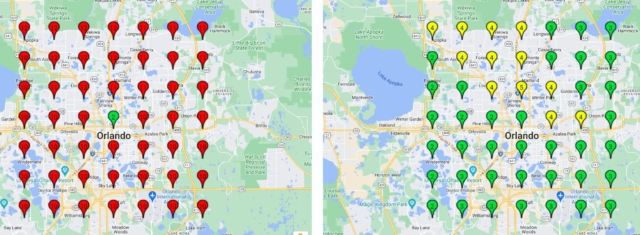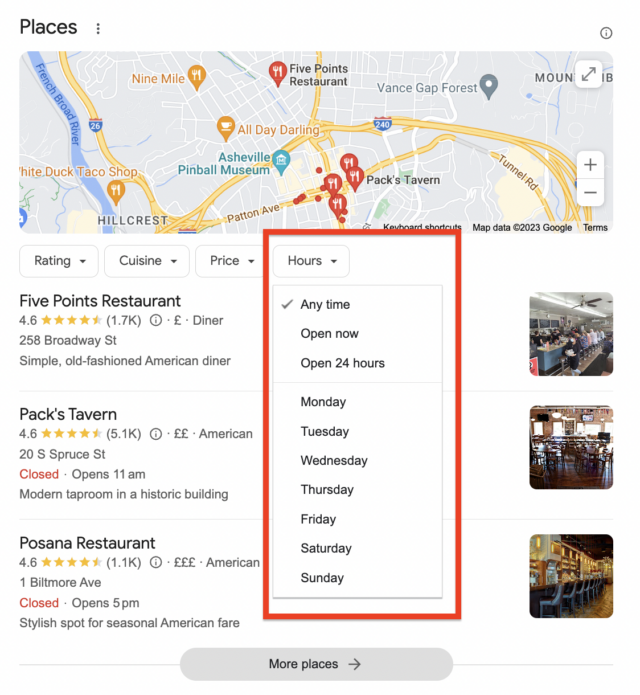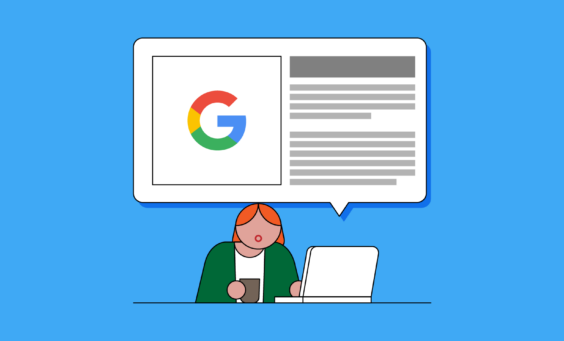These past few months have seen a variety of Google tweaks, tests, and updates, leaving some users uncertain of when a change is a permanent one. Alongside these changes, we’ve been witnessing some serious heat on our Local RankFlux algorithm monitoring tool. Meanwhile, the Local Search Forum was lighting up with chatter about strange rank fluctuations.
And, right around the same time that we saw RankFlux’s average score jump to a 4.38 out of 10, Joy Hawkins announced that she and her team at Sterling Sky had discovered a new local ranking factor: the opening hours stated on a business profile.
This announcement has led to lots of discussion throughout the community, with local SEOs sharing their take on the matter, speculating Google’s intentions, and running tests to verify the claim.
With no current consensus on the matter, what’s the best course of action? Leave those opening hours alone for now, and keep an eye on what’s going on. So… what exactly is going on?
What happened?
The announcement came during Sterling Sky’s Local Search Seminar with Joy Hawkins, Darren Shaw, and Luc Durand. Joy shared an image of two drastically different local search grids, noting that the two reports were run only two hours apart—one at 7am, before the business opened, and one at 9am, right after opening.

The initial tests determining this were done on three businesses—seemingly in the categories lawyer, psychiatrist, and phone repair—and were all seen on desktop.
3 so far. Trust me, it is.
— Joy Hawkins (@JoyanneHawkins) December 4, 2023
Sterling Sky has since run tests on “at least a dozen” businesses across multiple verticals, according to the webinar that announced the finding.
Hawkins also noted a difference between ranking patterns for more competitive keywords and less competitive ones: competitive keywords seem to encourage more variation in ranking.
You'll notice more ranking variation for closed/open businesses on competitive keywords. Here is an example of a really competitive keyword ("car accident lawyer") with quite a bit of variation, vs a less competitive keyword ("slip and fall lawyer") where there is no change. pic.twitter.com/dV04KEx2xl
— Joy Hawkins (@JoyanneHawkins) December 8, 2023
Note: This change doesn’t seem to stop businesses from ranking at all, simply prioritizing the open ones instead.
The Community Responds
It’s generally agreed upon that such a change to the algorithm could have big implications for both businesses and searchers. Alongside this, the announcement itself was met with apprehension and confusion, with many questioning Google’s intent.
“I think it is more than likely a bug vs a feature that was not thought out. In some ways it kind of makes sense: if a business is not open, should you show them on the map pack?
“Based on what Joy is seeing, if a business is marked closed they will not display as ranking in a local rank tracker. This was not true before. But there are some great arguments as to why this is a bad experience, such as users searching for a business and are planning for a future visit or service.“
– Ben Fisher, Steady Demand
@dannysullivan really want to know if this is intentional or a bug. It makes sense for some industries, but not for others.
— Joy Hawkins (@JoyanneHawkins) December 7, 2023
Additional questions have arisen regarding the significance of the long-standing ‘Hours’ dropdown, a Google feature that allowed searchers to filter their local pack results by hours.

It’s been posited that in the case of an intentional change by Google, perhaps data from this dropdown led Google to believe that searchers would appreciate hours being taken into the algorithm’s consideration.
After all, there are conceivable benefits to hours as a ranking factor, according to some. Usually, these revolve around minimizing the possibility of searchers showing up to a closed business.
Yes, definitely.
— Joy Hawkins (@JoyanneHawkins) December 8, 2023
However, alongside many others, Darren Shaw of Whitespark notes the potential issues of such a ranking factor, citing a variety of situations that would lead a searcher to look for a business that might not be open at that very moment.
Andrew's tweet is a perfect example of why this Google update is terrible for the quality of the local search results.
Google is now only showing businesses that are open right now?
So many reasons why this sucks:
– It's my lunch break and I'm researching X to do after work.
-… https://t.co/cPfyYZDDSW— Darren Shaw (@DarrenShaw_) December 7, 2023
In fact, his initial tests showed no indication to verify the effect of opening hours.
However, following further investigation, Shaw later went on to say that opening hours having an effect on ranking was “definitely a thing.” He also notes that opening hours aren’t a “binary ranking factor”—meaning that changing your ranking hours one way or the other won’t ensure that you rank… or that you don’t.
Yan Gilbert of Local Falcon also corroborated Sterling Sky’s data.
Operating hours are now factored into the Google Maps rankings #localseo pic.twitter.com/Koxbnc3MV7
— Yan Gilbert (@YanGilbertSEO) December 7, 2023
Others posted their own examples of the change.
Somewhere in the world, it is 5:00 p.m. … in this case almost 9 but you can always check if the business hours are a ranking factor. This is maps results, just refreshing the page, nothing else. @mblumenthal @JoyanneHawkins @ColanNielsen @rustybrick @Kevin__Pauls pic.twitter.com/TCcwvZB9IK
— Stan Kolev (@stankolev) December 10, 2023
However, despite these endorsements across the community, many are still uncertain as to the longevity of these ranking fluctuations.
Just to add a note here, if it’s a “bug” we’ve been seeing this since January of this year, and I noted what was happening back in April. This appeared way too consistent to be a bug in my opinion, particularly in the restaurant space. It appears that this is occurring in more…
— Matt Brooks (@m4ttbr00ks) December 8, 2023
What Google Has to Say
Ultimately, most seem to be looking towards Google for answers, with many echoing the sentiment that it could be a bug.
And, while Google’s Search Liaison has answered briefly, Google has yet to elaborate on the matter.
I'll pass it on. I doubt it has to do with the core update. It seems more likely a local ranking change, if it is one.
— Google SearchLiaison (@searchliaison) December 8, 2023
So… what next?
What does this mean for BrightLocal?
So far, we haven’t seen enough to say whether this is definitely a ranking factor long-term.
Before we confirm anything, make recommendations or change processes, we want to do due diligence to offer our customers the best service and insights possible.
That’s why we’re currently using Local Search Grid to run a wide-ranging and comprehensive study using data from 50 businesses across 10 verticals to truly understand whether a business’s opening hours impacts its ability to rank in the Local Pack.
We’re aiming to be analyzing the results of this study early next week, and intend to publish them shortly after. We hope that this study will allow the local SEO community to better understand the impact that opening hours have.
In addition to this, we are looking into what this means for our rankings tools as a priority and will be sure to let you know if any platform or report updates are required.
What should I do?
Until we know more, whether that be from the rash of studies that are cropping up or from Google itself, we would say to sit tight, don’t panic, and don’t make any huge changes to your opening hours in response.
It does seem that changing your opening hours to 24/7 has an impact on ranking. However, there are risks associated with this, whether it be the big kind (a profile suspension) or a smaller kind (a scathing review), so we would advise against making any changes at this moment. The last thing you want is an onslaught of one-star reviews.
In fact, according to BrightLocal’s 2023 Local Business & Trust Report, 62% of consumers would avoid using a business if they found incorrect information online. In some verticals, correct opening hours were especially significant, with consumers viewing correct opening hours as the most important factor for retail businesses (53%), food and drink businesses (51%), and entertainment businesses (47%).
“I encourage businesses not to jump the gun here; think about it and measure their calls. Do you really ever get a call at midnight?
“After this study was released I got a ton of calls from storefront clients, all asking ‘should I switch to 24 hours?’ My response is simple: if you will take a client at your door at 2AM, sure! If not, why risk being reported?
“Sure, 24 hours is least likely to lead to a suspension, but it can lead to a nasty review you will not be able to get removed, or if something else is fishy with your profile, you can be suspended.”
– Ben Fisher, Steady Demand
If you’re looking to investigate more closely, you can always run your own Local Search Grid reports during your business’s opening hours and compare them to the results of when it’s closed. Otherwise, just keep your eyes peeled for more information on this as we have it.
And, in the very wise words of our very own Claire Carlile:


